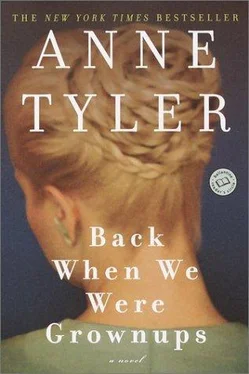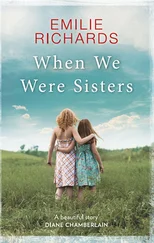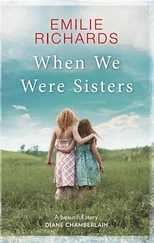“What does he do now that it’s summer?” Rebecca asked.
“Oh, eventually there’s day camp. Till that begins, he just stays in the house. He’s pretty used to fending for himself.”
“Maybe he’ll get to be friends with Danny. They’re almost the same age, after all.”
“Well…” NoNo said, in a doubtful tone.
Rebecca couldn’t much blame her. Danny was such an athlete, with an athlete’s easy confidence in his own body. The two boys seemed two different species, almost. So she didn’t push it. Out of the corner of her eye she saw Poppy leaving the kitchen with the marmalade jar tucked under his arm, and she said, “I’d better go. Have a good day, sweetie!”
“Thanks, Beck,” NoNo said. “And thanks again for the picnic.”
Rebecca hung up and went chasing after Poppy, who could make remarkable speed for an old man with a cane.
* * *
Her dream was the kind that lingered, coloring the whole morning. Bits of it rose like dust from her pillows when she plumped them — a sense of travel, a sense of longing. When she heard the harmonica sound of a train whistle from Penn Station, she felt a little pinch of loneliness deep in her chest.
The plasterer called; then Biddy called; then a woman called about a bridal shower. (Rebecca’s life was ruled by the telephone, she always said.) Each time she collected her thoughts to answer, she got that cotton-headed, almost nauseated feeling that comes from surfacing too abruptly from too heavy a sleep. More than one caller had to say, “Hello? Are you still there?”
When she opened Poppy’s closet to find him a shirt, the sweetish smell of worn clothing brought back the scent of her son. When she settled on the couch to pair socks, the feel of the fuzzy upholstery reminded her of the train seat — which, she recollected, had been covered in wine-colored plush of a sort she had not seen on trains in forty years.
* * *
Her daughter dropped by to leave her two children while she went to the obstetrician. “Anyone home?” she called, and the front door banged, as it always did, against the door of the closet. (Closet, ladies’ powder room, men’s — all these had been crammed into one side of the foyer, not very adeptly, when the Open Arms first went into business.) Rebecca invited her in, half hoping she would refuse because the morning was getting away from her, here. But Min Foo said, “Maybe for a minute,” and sent the children upstairs with their stack of videotapes. “Two whole months to go,” she said, leading the way to the kitchen, “or three if this is another ten-month pregnancy, and already I’ve gained twenty-one pounds. I look like a cow.”
Actually she looked more like a plum, or some other ripe, luscious fruit. She wore a black silk maternity dress and loops of golden chains strung with golden disks, and she walked with a slow, sultry, swaying motion that Rebecca found hypnotic. In the kitchen she sank onto a chair, her jewelry tinkling exotically. Rebecca said, “Would you like some coffee?”
“Mom! No way can I have coffee!”
“Oh, yes,” Rebecca said. Such silly rules they had, nowadays. “Well, I believe there’s some orange juice somewhere.”
She started hunting through the refrigerator, which was filled with picnic leftovers. “I dreamed the strangest dream last night,” she said over her shoulder. She shifted a plate hooded in foil. “I dreamed I had a son.”
“Maybe that’s a sign my baby will be a boy,” Min Foo said.
This struck Rebecca as the slightest bit self-centered. “No,” she said, “you weren’t anywhere to be seen. And besides, he didn’t have your coloring. He was a blond.”
Min Foo, like her three half-sisters, was a brunette, and she had Joe’s burnished olive skin and his narrow, sleepy eyes — almost Asian eyes, in her case, which was how she’d earned her nickname. Her real name was Minerva (Rebecca’s choice, for this child who would be hers, she’d imagined — the same calm, quiet, bookish type she herself had once been), but Joe had taken one look at the baby in her hospital cot, at her paintbrush hair and her eyes no wider than slits, and, “Hey there, little Min Foo,” he had said. She had never been anything but, from then on. So much for Minerva.
And forget about calm! Or quiet! Here she was now, all spiky and indignant: “I could have a blond baby! Certainly I could. Half my genes are yours, remember.”
“Well, maybe with Lawrence you could have,” Rebecca said. “But I seriously doubt you can hope for any blond genes from Hakim.”
Min Foo said, “Oh.”
Rebecca gave up on the orange juice and shut the fridge door as unnoticeably as possible. “Min Foo,” she said. “Sweetheart. Um, once this baby is born, you won’t send Hakim packing, will you?”
“Send him packing?”
“The way you did the others.”
Min Foo gave her a blank, astonished stare.
“I just couldn’t help but notice,” Rebecca told her, “that you always divorce your husbands after you have their babies.”
“Always!” Min Foo repeated. “You talk as if I’d had fifty husbands!”
“Well, but… three is not a negligible number, you have to admit.”
“It’s no fault of mine that I happened to hit a teensy little run of bad luck,” Min Foo said. “Honestly! You make such a big deal about that. Every time I turn around, some jibing, jabbing remark. ‘You’re not booked this weekend, are you? Getting married or anything.’ And, ‘Oh, that was a gift from what’s-his-name, one of Min Foo’s husbands.’”
Rebecca laughed, impressed by her own wittiness, but Min Foo stayed serious. “Everything’s just a joke to you,” she said bitterly. “Even at our wedding reception: someone says how nice it is and you say, ‘Well, it ought to be nice, as much practice as Min Foo’s given me.’” She gathered the folds of her dress and stood up. “Don’t bother seeing me out,” she said. “I’m leaving.”
“Sweetheart!”
“I’m late for my appointment, anyhow.”
“Oh, all right,” Rebecca said sadly, and she trailed her to the front of the house, trying to think of some parting comment that would smooth things over. But none came to her.
Her brother-in-law had a theory that Min Foo’s many marriages were her way of trying on other lives. The first husband had been a professor in his sixties, and Min Foo (age twenty-one) had instantly turned into a settled faculty matron. But with the second husband, who was black and eight years her junior ( two differences, Zeb pointed out; very efficient of her), she’d become a young slip of a girl and taken to wearing a head-wrap. Hakim, now, had her spangled with Muslim holy medals. Rebecca liked Hakim, but she was careful not to get overly invested in him. That was why she kept up the pretense that she didn’t know where he was from. Of course she knew where he was from; she wasn’t senile. But, “Oh, he’s something, ah, Middle Eastern, I believe,” she would say when asked.
Oops. Just the sort of remark that Min Foo had been objecting to.
* * *
The children were upstairs in the ex-nursery that served as the family room, watching a videotaped cartoon. You had only to look at them to guess Min Foo’s whole history — Joey a freckled eight-year-old with straight black hair and blue eyes, Lateesha four years younger and decked out in tiny beaded braids, her skin the warm, soft brown of a baked potato.
“Hey, kids,” Rebecca said, “who wants to help me decorate for a party?”
They didn’t take their eyes from the screen, but Joey said, “What kind of party?”
“Graduation; high-school graduation. Teenagers galore! I’ll need to consult with you two so I don’t do anything uncool.”
Читать дальше












